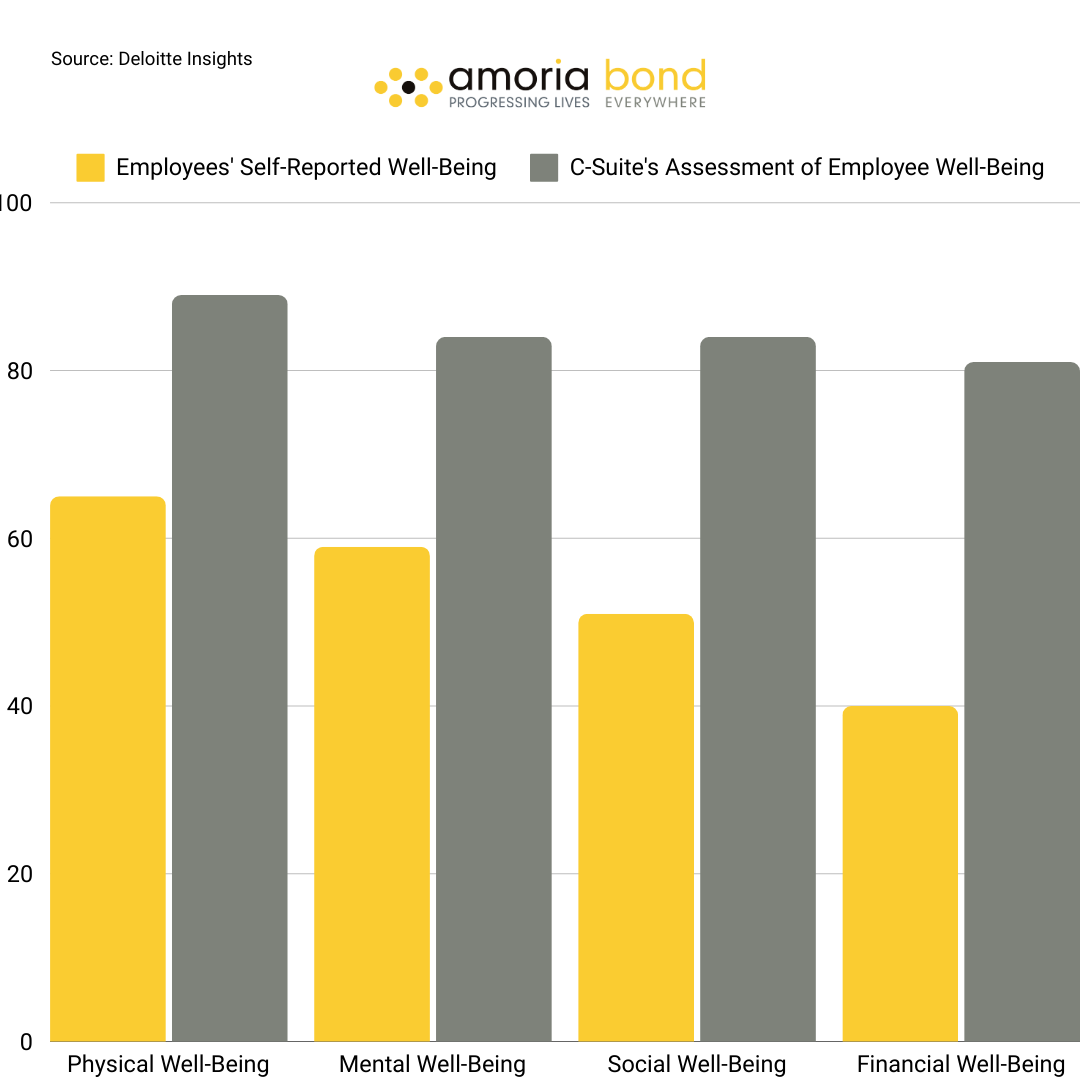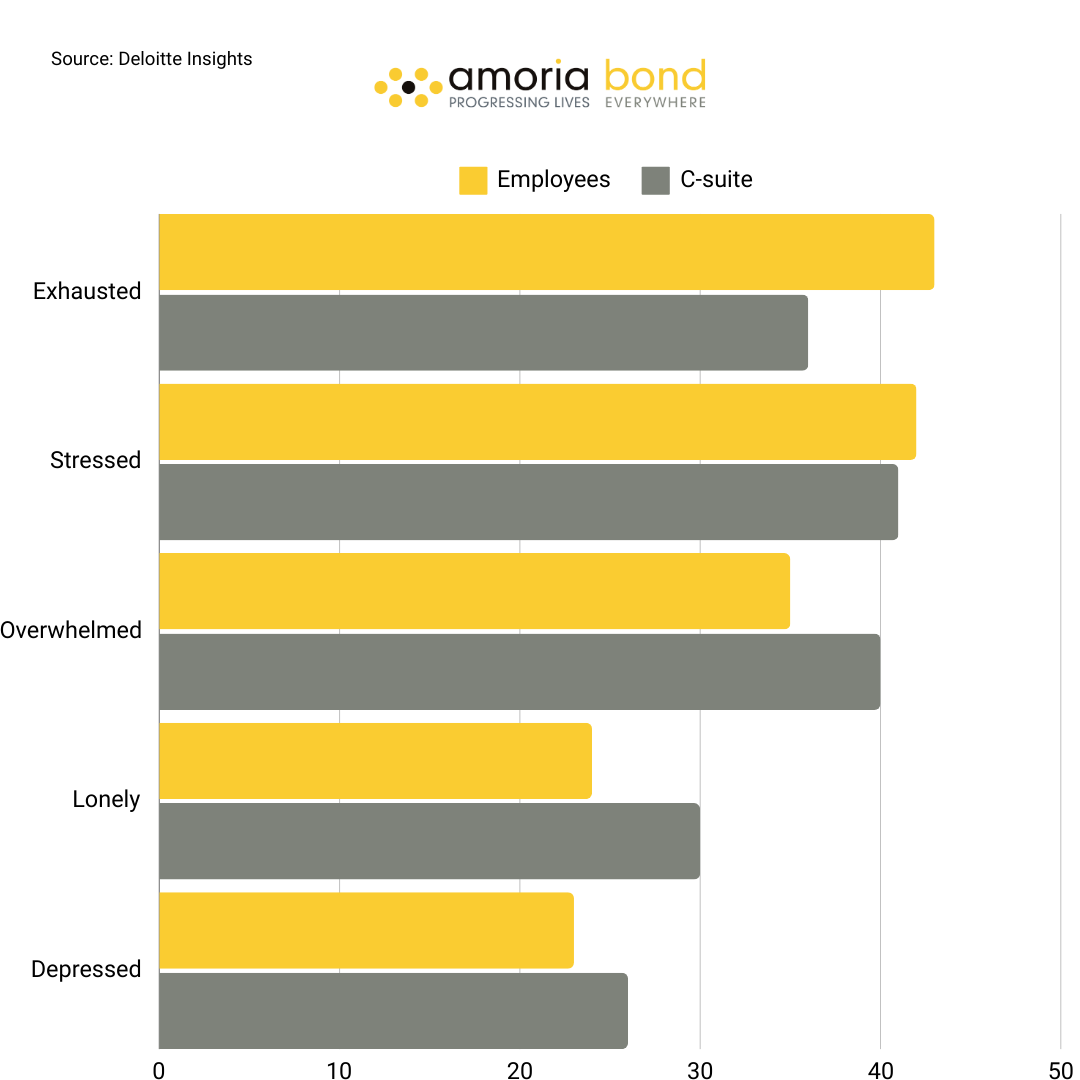Picking up the kids from school at 3 PM, working from home, or taking sports classes with your colleagues has become quite common in recent years, highlighting the professional well-being revolution. Initiatives such as early finishes, flexible time schedules, and remote working do help, but are employers doing enough?
With Gen Z and millennials joining the workforce, the professional landscape has experienced significant changes, with a greater focus on mental health. Employers have therefore stepped up with well-being initiatives over the years, but there is still room for improvement.
Amoria Bond conducted a poll on their LinkedIn channel to ask their network about the well-being initiatives they would like to see more of at work. In this article, we will discuss those numbers, as well as well-being benefits employers can implement. Additionally, this article will explore some interesting results from a well-being survey conducted by Deloitte. Lastly, we will discuss how Amoria Bond promotes mental health awareness.
Statistics on the Well-Being of Employees
Amoria Bond reached out to their LinkedIn network by conducting a poll: ‘What well-being initiative do you want to see more of at your workplace?’ 129 employees from all over the world have responded, expressing their well-being needs. Here are the results:

Of all respondents, 64% expressed a desire for more flexible work arrangements, including flexible hours and remote working. Additionally, 28% emphasised the importance of less micromanagement. While well-being initiatives were welcomed by our network, they were not as crucial as the first two options. Only 8% prefers more well-being initiatives. The conclusion of this poll is that employees seek especially more autonomy and flexibility in their job, creating an environment of responsibility, trust and support.
Following this poll, another question arises: How significant is well-being, and what insights do these numbers offer regarding employees' needs?
Deloitte has conducted a survey on employee well-being of employees, examining perspectives from both C-suite executives and employees. Collaborating with Workplace Intelligence, an independent research organisation, Deloitte surveyed 2,100 employees and C-level executives across four nations: the United States, United Kingdom, Canada, and Australia. The survey findings revealed striking revelations, with nearly 70% of C-suite members actively considering leaving their current positions for roles that prioritise their well-being more effectively.
Below are two graphics depicting the mental health status of both employees and C-suite executives, as well as the perceptions of the C-suite regarding employees’ health:"


The first graphic on the left reveals that C-suite executives tend to overestimate the mental health of their employees, resulting in dissatisfaction and reduced productivity. However, it's important to note that mental health issues are not exclusive to employees; the second graphic on the right indicates that C-suite members also experience mental health challenges. In fact, C-suite executives often report feeling more overwhelmed, lonely, and depressed than employees.
Furthermore, the survey uncovered that 57% of employees and 69% of C-suite executives would consider leaving their current roles for positions that better support their well-being. However, there is a positive aspect to these findings: 62% of employees and 82% of C-suite executives would choose to remain with their current company if it provided better support for their well-being.
Why Should You Invest in Well-Being?
The last paragraphs underscore the critical need for improving the mental health of employees. Neglecting this aspect could lead to a significant financial loss of more than 1500 euros per employee annually. Additionally, 69% of line managers acknowledge that supporting employee mental health is a core skill. Sadly, only 14% of employees feel like they can talk to their manager if they experience mental health issues.
The findings from Deloitte and other sources demonstrate that employees often lack the necessary mental health support in the workplace, despite the clear benefits that mental health awareness and support can bring to all parties involved. Therefore, the conclusion of our poll and research is evident: integrating more well-being options is not only essential for boosting revenue, reducing turnover, and fostering a healthier work environment but also a strategic necessity for sustainable growth. Investing in employee well-being transcends mere moral obligation; it is a fundamental component of a successful and thriving organisation.
The next question of this article is: What can you do as an employer to support the mental health of your employees?
Flexible Work Arrangements
Flexibility is the key to productivity and revenue. Our poll and research clearly state that employees want more control over their work life by choosing when and where they work to balance their private and professional life. What flexible arrangements are the most common and popular among employers?
Traffic, snooze buttons, and long travel times are no longer problems thanks to flexible work arrangements. As of 2023, approximately 12.7% of full-time employees worked from home, while nearly 28.2% had adopted a hybrid model, alternating between their homes and office spaces. Nevertheless, the majority, comprising 59.1%, continued to work from traditional office settings.
Looking ahead to 2025, Forbes anticipates that approximately 32.6 million Americans, constituting about 22% of the workforce, will join the remote work trend. What's striking is that an overwhelming 98% of workers express a desire to incorporate remote work into their schedules, highlighting a growing yearning for the flexibility, autonomy, and improved work-life balance that remote setups offer.
How do you implement flexible work arrangements? You can offer various options to your employees, ranging from one remote working day to fully remote work. Consider how much flexibility you want to offer. Can your employees choose which days they want to work from home? Can they change their remote workdays? Another question is whether your employees are only allowed to work from one location or if they can work from abroad.
Besides remote working options, people want to work when they feel the most productive. That’s where flexible work hours come in. Whether you're an early bird or a night owl, flexible work hours allow you to adapt your work to your lifestyle. Dropping the kids at school or going to the doctor's office becomes much easier with flexible work hours. Additionally, it stimulates productivity because employees work when they are 100% focused. Of course, it’s normal to regulate work hours, so that employees don’t work at night. Therefore, you can set core hours, where everyone needs to work, for example: 10 AM- 4 PM.
Less Micromanagement
28% of respondents think they should get more autonomy at work and less micromanagement. Micromanagement, while often well-intentioned, can stifle creativity, demotivate employees, and hinder productivity. It involves excessively controlling or monitoring every aspect of tasks or projects, leaving little room for autonomy or independent decision-making among team members.
To reduce micromanagement in the workplace, leaders can foster a culture of trust and empowerment. Delegating tasks with clear expectations and providing employees with the necessary resources and support allows them to take ownership of their work. Encouraging open communication, offering constructive feedback, and recognising achievements can also help build confidence and competence among team members, ultimately leading to a more efficient and harmonious work environment.
By striking a balance between guidance and autonomy, managers can create a culture that nurtures creativity, innovation, and employee satisfaction. Above that, employees feel validated by their companies, leading to loyalty and positive brand image.
More Well-Being Initiatives
While only 7% of our LinkedIn network expressed, they want more well-being initiatives, it's crucial to recognise that workshops, benefit cards, reduced sports courses, and mental health support not only benefit employees but also managers. Employees gain the ability to balance their work, private life, and mental health, while managers learn to promote and support employee mental health, thus enhancing their managing skills and creating a healthier work environment. Here are some health benefits you can offer your employees:
Financial health workshops/trainings
Reduced memberships to sport clubs
Mental health awareness workshops/trainings
Sports courses at work
This option indeed requires more management involvement compared to flexible work arrangements or reducing micromanagement. The C-suite needs to invest time to evaluate well-being initiatives and organise them effectively. One potential solution could be to establish culture committees tasked with organising and evaluating these initiatives. These committees can then report to management on the initiatives' impact on employee well-being, streamlining the process and ensuring effective implementation.
Other Well-Being Options
Employee Assistance Programs (EAPs): Providing access to EAPs, which offer confidential counselling and support services for personal or work-related issues, can help employees cope with stress and improve their overall well-being.
Mental Health Resources: Offering mental health resources such as counselling services, online therapy platforms, or mental health awareness workshops can support employees in managing stress, anxiety, and other mental health challenges.
Social Activities: Facilitating social activities such as team-building events, group outings, or lunchtime gatherings can foster a sense of community and connection among employees, which contributes to their overall happiness and well-being.
Recognition and Rewards: Implementing recognition programs that acknowledge and reward employees for their efforts and achievements can boost morale, motivation, and job satisfaction, contributing to overall well-being.
Workload Management: Ensuring that workloads are manageable and realistic, and providing support or resources, when necessary, can prevent burnout and support employees in maintaining a healthy work-life balance.
Flexible Benefits Packages: Offering flexible benefits packages that allow employees to customise their benefits based on their individual needs and priorities, such as health insurance options, wellness stipends, or additional time off, can support their overall well-being.
Mental Health Benefits with Amoria Bond
At Amoria Bond, we prioritise the mental health and well-being of our employees. That's why we offer a range of initiatives, including flexible work arrangements, religious holiday swaps, inclusion advocates, mental health workshops and trainings, and many more.
We actively listen to the needs of our employees to ensure their career and personal development. As a result, we evolve our culture according to the needs of our employees. Interested in learning more about our benefits and culture? Visit our website to discover more culture.
Progress Your Life with Amoria Bond
Amoria Bond is an award-winning recruitment organisation with more than 15 years of experience within various markets, such as Energy, Technology and Advanced Engineering. We progress the lives of our clients, employees and wider community by always striving to give the best service possible.
We offer 360° solutions, tailored to your staffing needs. Also, we are happy to advise you on how you can integrate the topic of well-being into your recruitment process and your company in order to attract and retain top talent. Contact our teams today to schedule a quick call or for more information about our services.







